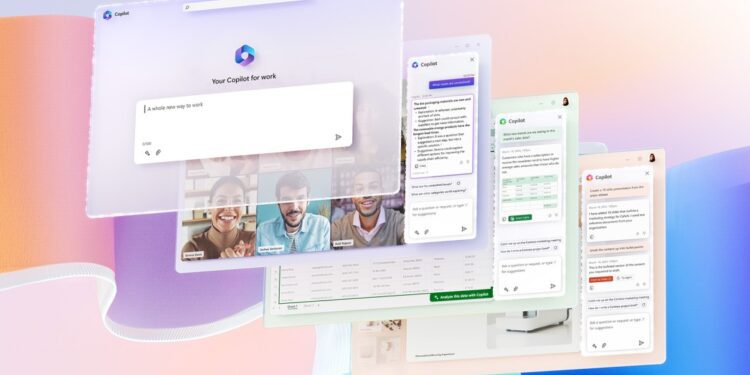Microsoft has introduced a thrilling new functionality for its AI assistant, Copilot. The technology behemoth is preparing to roll out a public preview that will enable users to craft and customize their very own virtual assistants. These smart agents are engineered to “comprehend the nature of your work and take action on your behalf,” as stated by Microsoft. This breakthrough in artificial intelligence aims to enhance “productivity, engagement, and innovation,” and is set to aid in effectively replacing certain workplace tasks.
The collaboration of Copilot’s autonomous agents with human employees
This technology’s capabilities are already remarkably sophisticated. Microsoft disclosed that the agents will possess the capacity to independently conduct research for leads, engage in tailored email dialogues, and address customer service inquiries instantaneously. As the agent becomes more integrated and acquainted with the company and its goals, its autonomous functionalities will continue to evolve and improve.
Major tech companies acknowledge that the issues surrounding the progression of AI and job stability are at a pivotal moment. As Microsoft advances its deployment, it is marketing these products as instruments built to collaborate “hand in hand” with human workers, stressing synergy rather than substitution. Responsibilities like sorting significant emails, monitoring data, and producing reports—tasks that frequently take up many hours of employees’ workdays—are likely to fade into history.
Just as payroll systems transitioned to digital formats in the early 2000s and platforms like Zoom surged to prominence during the COVID-19 crisis, innovations like Copilot are anticipated to have a significant industrial effect, potentially on a broader scale. Jensen Huang, CEO of Nvidia, conveyed to Wired’s Lauren Goode at the 2024 SIGGRAPH conference, “Every individual will have an AI assistant. Each company, every role within it, will be accompanied by AI support.”
Envisioning workplace efficiency with Copilot’s new features
An upcoming public preview of advanced agents is anticipated to launch next month in the Microsoft Copilot Studio, ensuring a user-friendly experience for those familiar with large language model interfaces. Your main task will be to steer the AI, enabling it to find its own direction. By setting up a few essential guidelines and specifying certain triggers, this groundbreaking technology will ideally manage a significant portion of the workload autonomously, capitalizing on the extensive data you supply. Furthermore, Microsoft has announced ten new autonomous agents for Dynamics 365, its all-encompassing enterprise resource planning tool.
Microsoft has also given an update regarding the eagerly awaited Recall feature for Copilot, which has been postponed for quite a while. “With Recall, you have a navigable timeline of your PC’s previous activities,” the firm claims. This AI-driven tool has already sparked considerable concerns about security and privacy, as it captures regular screenshots of a user’s screen, enabling easy navigation and searching through past actions. Recall will operate on an opt-in basis and encrypts all information: “If a user does not actively opt to enable it, it will remain disabled, and no snapshots will be captured or stored,” Microsoft assures.
In early October, Microsoft revealed that its AI assistant, Copilot, now features a human-like voice and the capability to deliver emotional support. “It’s coaching you, encouraging you, supporting you, teaching you. I think it will no longer feel like a computer,” remarked Mustafa Suleyman, CEO of Microsoft AI, in an interview with Wired.
Microsoft Copilot Studio, offered at $200 per month for 25,000 messages, is tailored for organizations looking to create custom AI agents for personalized customer interactions and to optimize internal operations across various channels. Meanwhile, Microsoft 365 Copilot provides a more economical option at only $30 per month for those with basic AI requirements.


